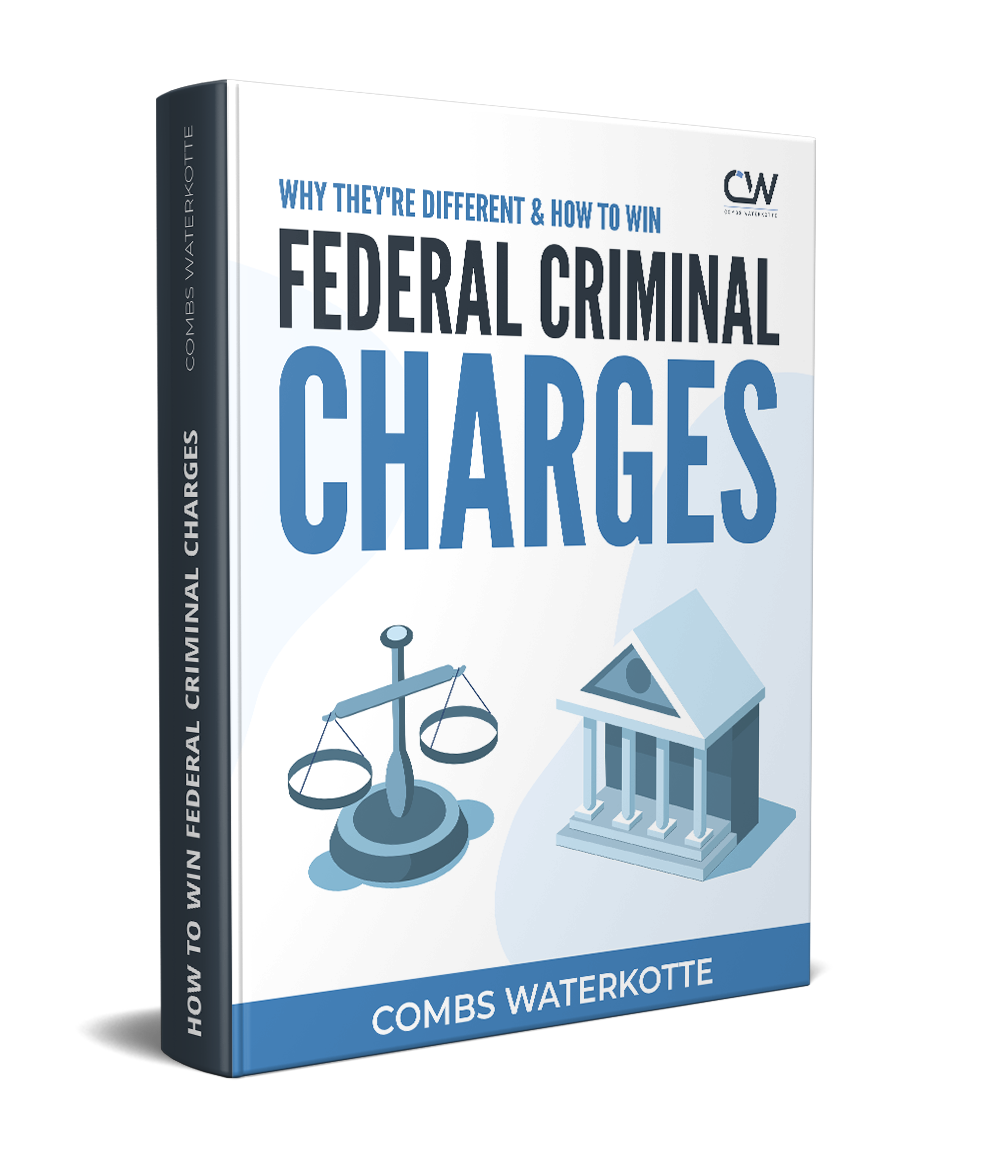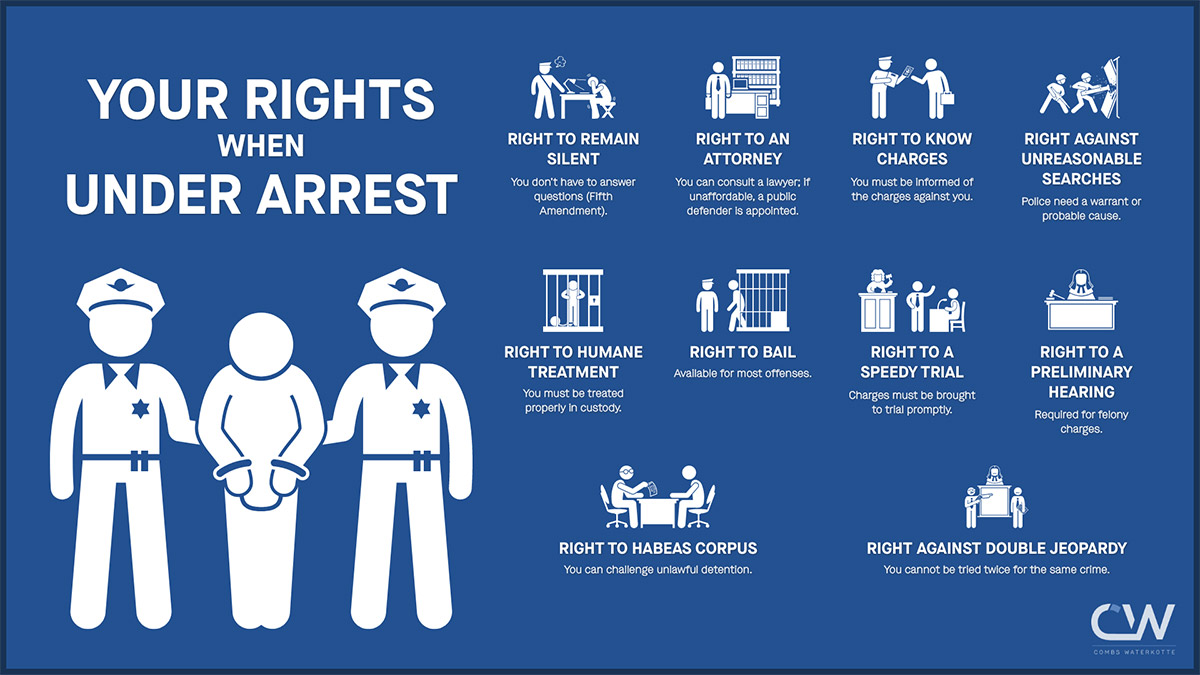A federal criminal defense lawyer in Madison, WI represents clients in complex legal battles within the federal criminal justice system – with potential outcomes like incarceration, financial ruin, and irreversible reputational damage.
Federal criminal cases in Madison, WI are different from state charges in almost every way: they carry more severe consequences, involve more complex rules, and are pursued by well-resourced federal agencies.
If federal charges are on the table — or even just being discussed — it’s critical to begin your defense immediately. Federal agencies like the FBI, DEA, or IRS may already be building a case against you – and once they act, they want to move fast.
This isn’t something you should try to handle on your own, Combs Waterkotte‘s Madison, WI federal criminal defense lawyers provide experienced legal support from the start – built on decades of courtroom knowledge and a history of defending our clients’ freedom. The sooner you call, the more we can do, and the sooner you can move on with your life.
Article Summary
- Federal crimes are prosecuted in U.S. District Courts and typically involve violations of federal law, crimes across state lines, or offenses investigated by federal agencies.
- Common federal charges include drug trafficking, wire fraud, tax evasion, money laundering, weapons offenses, and cybercrime.
- Federal cases differ from state cases because they involve different prosecutors, sentencing guidelines, legal standards, and court procedures.
- The federal legal process moves from covert investigations through indictment and into plea bargaining or trial, followed by sentencing.
- Early legal intervention is critical – particularly if you’ve been questioned by agents, served with a subpoena, or suspect you’re under federal scrutiny.
- Our firm provides aggressive, experienced federal defense in Madison, WI and offers immediate case evaluations and no-cost consultations to begin building your defense.

Free book
Facing Federal Criminal Charges? Why They’re Different and How to Win
Combs Waterkotte, Missouri and Southern Illinois’s leading federal criminal defense law firm, has handled over 10,000 cases successfully. This ebook guides you through the federal criminal defense process, how federal charges are different, and how to win.
What Makes a Crime in Madison, WI “Federal”?
The Tenth Amendment of the U.S. Constitution reserves most criminal enforcement to individual states. In most cases, state courts handle offenses like theft, assault, or DUI.
But when a crime affects national interests, crosses state lines, or involves federal property or agencies, it falls under the jurisdiction of the federal government.
Your case may be prosecuted federally under the following conditions:
- It violates a federal statute such as laws related to fraud, narcotics, or financial crimes.
- It involves multiple states or influences economic activity between multiple jurisdictions.
- It happens on federal property (like a military base or post office).
- It targets the federal government, involving crimes against institutions like the IRS, federal courts, or elected officials.
- It involves serious, complex, or national-level criminal activity requiring federal-level enforcement and prosecution due to its scope or impact.
Key takeaway:
What makes a crime federal isn’t just who’s involved — it’s how the entire legal system changes around it. They’re governed by a system of law that is often different from WI’s state law. You deserve a lawyer who knows federal rules, judges, and how to protect your rights at every stage.
Common Federal Charges We Defend in Madison, WI
The federal system handles an array of serious offenses — from large-scale fraud schemes to trafficking cases that span jurisdictions. What unites all federal cases is the fact that the U.S. government prosecutes them aggressively, using its full legal and investigative power.
Combs Waterkotte’s Madison, WI federal criminal defense lawyers protect the rights of clients against a broad spectrum of federal charges, including:
- Federal drug trafficking and distribution
Includes the manufacturing, sale, or transportation of controlled substances, especially when crossing state or national borders. - Federal wire fraud and federal mail fraud
Applies to cases where someone uses digital or postal channels to deceive victims — often involving complex investment or scam allegations. - Federal money laundering
Involves structuring or layering financial activity to hide the unlawful origin of assets. - Federal tax evasion and financial crimes
Occurs when individuals or businesses avoid paying federal taxes through deception or omission, often linked to broader fraud cases. - Federal weapons offenses
Covers firearm possession, sale, or transport when linked to other crimes or restricted individuals. - Federal child exploitation and federal child pornography offenses
These highly sensitive cases demand a thoughtful, tactful defense and often carry severe sentencing risks. - Federal cybercrimes
Encompasses internet-based crimes that target individuals, businesses, or government systems across jurisdictions. - Federal public corruption and bribery
Covers cases where officials are accused of abusing power for personal gain or financial benefit. - Immigration-related offenses
Handled by federal prosecutors and often initiated by Homeland Security or ICE investigations.
To compare:
A theft case in state court may be resolved quickly by local authorities, but federal fraud charges can trigger complex investigations involving the FBI, expert analysts, and a grand jury. That difference in scale changes not just the risk, but how your defense must be built from day one.

How the Federal Criminal Process Works in Madison, WI
Federal criminal cases follow a very different path than their state counterparts. In many cases, investigations start well before an arrest is made.
Here’s how a typical federal criminal case unfolds:
Step 1: Investigation
Federal law enforcement investigations typically begin quietly and last for months. Agencies like the FBI, DEA, or IRS may monitor bank accounts, intercept communications, or build a case over months – even years – before making an arrest.
Most common mistake: Delaying legal help until after you’ve been charged — rather than acting during the investigation. Getting counsel early gives us more options to influence the outcome.
Step 2: Indictment
Once federal prosecutors think they have a strong case, they take it before a grand jury.
If the grand jury agrees, it issues an indictment, which is a formal charge – often the first time a defendant learns they’re being prosecuted.
Step 3: Arraignment and Pretrial Motions
You’ll appear in court to enter a plea. This is the first opportunity for your federal defense lawyer in Madison, WI to weaken the government’s case and influence what happens next.
Strong early motions and investigations can sometimes result in charges being dropped.
Step 4: Plea Negotiations or Trial
Many federal cases end in a plea agreement, but not all. If necessary, we’ll take your case to trial and advocate for you aggressively in front of a jury.
This requires experience with federal rules of evidence, courtroom strategy, and trial advocacy.
Step 5: Sentencing (if applicable)
Federal judges rely on detailed sentencing rules set by the Guidelines, considering both the harm done and your record.
In some cases, mandatory minimums limit the judge’s discretion — increasing the stakes at sentencing.
Step 6: Appeals (if applicable)
You may have the right to challenge your conviction or sentence in the federal appellate courts – a process that requires meticulous legal arguments and deep familiarity with federal law.
In summary:
Federal criminal cases move quickly and follow strict procedural rules. Federal agents and prosecutors have a head start — your defense should be just as prepared.
How Our Madison, WI Federal Criminal Defense Lawyer Approach Federal Cases
Successfully handling a federal case takes more than knowing the law – it requires timing, strategy, and the ability to respond to an aggressive and complex system.
We focus on intervening early, investigating every angle, and building a relentless, client-first defense strategy.
Step 1: Early Intervention
It’s critical to involve a defense attorney as early as possible — ideally before charges are filed. A target letter, subpoena, or visit from federal authorities usually means the government is preparing to charge you.
Our role starts with direct communication with the prosecution, asserting your rights, and helping shape the case before charges are finalized.
Step 2: Strategic Investigation
Rather than reacting to the government’s version of events, we launch our own investigation immediately. We collaborate with private investigators, forensic analysts, and expert witnesses to find what the prosecution missed — and use it to your advantage.
Step 3: Realistic Negotiation
In many cases where the state’s evidence is strong, especially where mandatory minimums apply, negotiating a smart plea deal is key to avoiding disastrous outcomes.
Even during plea talks, we continue preparing for trial — because leverage comes from being ready to fight.
We give you all the information you need and leave the ultimate decision in your hands.
Step 4: Trial Readiness
When trial is necessary, we bring proven trial attorneys with a track record of federal victories to the table. Our strategy focuses on clarity, credibility, and powerful storytelling that resonates with federal juries.
Step 5: Sentencing Advocacy
A guilty verdict isn’t the end — we shift focus to minimizing the impact. We prepare detailed sentencing memoranda, present mitigating factors, and argue for the lowest possible penalties under the Federal Sentencing Guidelines (or outside of them when appropriate).

Free book
How to Choose a Criminal Defense Lawyer
Charged with a crime? The lawyer you hire matters. Combs Waterkotte, recognized for top-tier criminal defense in Missouri and Southern Illinois, created this guide to help you find the right attorney. Learn what to look for, key questions to ask, and red flags to avoid.
Why Choose Us as Your Madison, WI Federal Criminal Defense Lawyers?
Not every Madison, WI federal criminal defense lawyer is equipped to handle federal charges, and not every law firm understands the pressure you’re under when the federal government comes after you. Our Madison, WI federal criminal defense lawyers do. Clients throughout Madison, WI, have trusted us to defend them against aggressive federal investigations and devastating legal threats.
Why our firm stands out:
- Focused federal experience
We have a proven record of defending clients in federal court near Madison, WI, and understand how local judges, prosecutors, and procedures operate. - Serious strategy, not surface-level support
From grand jury subpoenas to trial advocacy and sentencing mitigation, we tailor every step of your defense to the unique realities of federal prosecution and the facts of your case. - Responsive, personal service
We pride ourselves on being accessible and responsive — we talk like people, act fast, and give your case the attention we’d want if we were in your shoes. - Results that matter
From reduced charges to trial wins, our results have helped clients avoid prison and move forward with confidence.
Take Action Now – Call a Federal Criminal Defense Lawyer in Madison, WI Now
If federal agents are knocking or you’ve been charged in Madison, WI, don’t wait another day to protect yourself. One wrong move early on can make your defense harder — but early legal action gives you power and control.
We offer confidential, no-pressure consultations to help you understand your rights, your options, and what comes next. Whether you’re under federal investigation, have received a target letter, or are already facing indictment, you want Combs Waterkotte’s Madison, WI federal criminal defense lawyers to start protecting your rights and your future immediately.
Reach out now at (314) 900-HELP or send us a message — we’re ready to help you take the first step.



